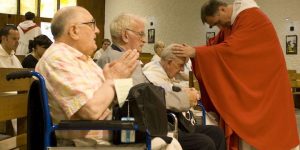Many people claim to have experienced God directly in some way. They claim to have seen a vision, or received divine healing, or they have had some deep spiritual experience, or God has turned their lives around in some way. They come from different religions, even from no religion and atheism. Sometimes the experience changes their lives completely, sometimes not so much.
The interesting question, of course, is whether God is really the origin of their experience, or not. If so, then life takes on a different meaning. But even if these experiences have natural causes, they are still of great interest to psychologists.
Visions of Jesus

It seems that people see visions of Jesus more often than we might think. Philosopher Phillip Wiebe found 30 people in his local area in Canada who reported having one of more visions of Jesus, and it seems that thousands of Muslims have also seen him in visions.
The Canadian cases include several people who were not christian believers, but who converted as a result, and several cases where the person was also dramatically healed at the same time as the vision. One of those who saw a vision and received miraculous healing wrote on this blog, 40 years later, that the vision was still very real to him, and that the most important element was not healing, but the sense of being loved (see comments on Visions of Jesus? (again)).
Wiebe has documented the cases he investigated, and analysed possible causes. The obvious explanation is that they have had a hallucination or an apparition brought on by stress or wish fulfilment, but Wiebe has examined each of these (and many other natural and supernatural explanations) and found that none of them can explain the facts in every case.
The cases of Muslims seeing visions of Jesus and converting, despite the consequences, are also very interesting. Some are well documented, and some involved supernatural healing. There is no reason I can think of for these converts to lie about their experiences, which often cost them dearly in terms of family and friends.
There can be little doubt that something quite interesting and unusual is going on, whatever explanation is accepted. These are not just urban myths. The many plausible accounts must surely make it at least a little more likely that God really exists.
Mystical (or deeply spiritual) experiences
These “transcendent” and “spiritual” experiences are not easy to describe because they are very individual, and those who experience them find them difficult to fully express. They generally involve heightened perceptions, a feeling of unity and oneness, and a sense of a personal presence, often understood as the presence of God. Often these experiences lead to a feeling of peace and joy and of a new understanding of the world or of life.

Studies show that about half of all people in the western world have had some sort of spiritual experience like this, and for about 10% of these, the experience has been very intense or overwhelming. Most of these experiences occur to religious believers, but non-believers can sometimes experience them.
These experiences have been studied in depth by psychologists, and in general they cannot be explained by mental illness or as “the results of epileptic hallucinations or …. triggered by drugs, illness, physical exhaustion, emotional stress or sensory deprivation” – neuro-imaging shows that the mystical experiences are not the same as “abnormal” psychological experiences.
In fact those who receive these experiences are generally of higher than average intelligence and education, and physically and mentally healthy. The experiences tend to have a positive effect on their subsequent lives and wellbeing.
One researcher has argued that since these experiences of God (as most of them are), they have been documented and can be tested scientifically, they arise from normal psychology and have positive results, and they meet criteria used to test the reality of our experiences of the world, there is a prima facie case for concluding that these are real experiences of God.
Miraculous healings

It has been estimated from surveys that literally hundreds of millions of people claim to have experienced or observed healing after prayer to the christian God. Only a small percentage of these claims have been documented, still less have been assessed by competent medical doctors.
But this still leaves us with a large number of documented apparent healings.
For example:
- Millions of people claim to have been healed at Lourdes. There are doubtless many mistaken or misreported claims, but thousands have been documented, and in about seventy cases there was sufficient medical information for an international medical commission to verify an unusal healing with no medical explanation, and so confirm that it appears that a miraculous healing had occurred.
- Medical specialists have investigated apparent occurrences of miraculous healings and written them up in books, and in one case, in a paper in the British Medical Journal. Again, many recoveries from conditions that don’t normally recover naturally have been documented to occur after prayer.
- Thousands of drug addicts in Hong Kong have been healed of their addictions after prayer, most going through withdrawal without medication and without pain, which is unusual. Sometimes the healing was instantaneous, most times prolonged prayer was required.
- I have found two individual cases where heart attack patients were pronounced dead by expert medical teams, but after prayer, recovered without any brain damage.
Of course it remains true that prayers for healing don’t always lead to the desired healing. One study showed that about a third of people who received prayer for healing at a christian healing meeting did receive full or substantial healing, a quarter received “a fair amount” of healing, and about 40% received little or no healing. In general, I imagine the percentages of people healed after prayer would be much less than this – perhaps being present at a healing meeting has some value!
Nevertheless, the fact that many unusual recoveries have occurred after prayer requires an explanation, and the obvious explanation that “god did it” must be considered at least possible.
Positive life-changing experiences
Some people grow up believing in God; some keep believing, some stop. Others never believed.
Some people’s lives go according to plan, and everything seems to work out right for them. But many others find that life takes them into dark places. Relationships break, or loved ones die; sickness strikes them down or they fall into an addiction. Or maybe it is something less obvious – they lose their way, or life seems pointless. Perhaps they are successful, and they wonder if that’s all there is.
Sometimes people find that God comes to them in their weakness and disillusion, and somehow heals them, gives them hope and lifts them up, and their lives take on meaning again.

I have collected a number of these peoples’ stories. Some of them had troubled lives involving prison, addiction or abusive relationships. Some received healing. Others found a totally new direction in their lives.
But what they all have in common is the firm belief that God had intervened in their life and helped them find new direction and new hope.
Were they right? Is this evidence or just wish fulfilment? I don’t know how you could prove this one way or the other, but surely personal experience counts for something?
Finding meaning in a surprising place
It is common knowledge that christianity has been losing ground in first world countries for a century, and some pundits have predicted its demise Real Soon Now, as first the more educated and then the masses realise that religion is untrue and pointless.

But there is another, quieter, narrative, of highly educated people with a commitment to non-theistic humanism “finding God”. The stories I have collected include university professors, a judge, a lawyer, journalists, an engineer and other professionals.
Most investigated the evidence for christianity over an extended period of time, and some also had an experience of God that challenged them.
There is no obvious intervention by God in most of these stories, but most still credit God with opening their eyes to see the truth that was there all along.
Adding it all up
There is more than one type of evidence.
Sometimes evidence is a clear “smoking gun” – one fact that just nails the truth of the matter, and leaves little doubt.
But often, in police cases, in life, and in thinking about God, evidence accumulates gradually, piece by piece. There is no single decisive fact that changes everything, but rather the sum of lots of small pieces information ends up making the answer highly probable.
I think that is the case with people’s experiences of God.
- People could see visions of Jesus out of their own brains, but it doesn’t seem to be likely in every case.
- People could have deep, even mystical, experiences of God out of their own brains, but it seems unlikely that such imaginary experiences could have the consistent good effects that they do.
- People might, after prayer, recover from conditions medical science is unable to cure or even improve, but the improbability of spontaneous remissions and the association with prayer for healing suggests a better explanation.
- People might find new hope in life without God, and often do, but when they report that God did it, their evidence counts for something.
- And smart people might be mistaken about the evidence for God, but going against the intellectual flow and coming to an unexpected conclusion might at least make us wonder.
But the probability that people would see visions of Jesus, and others would find their lives improved by an encounter with God, and others find healing after prayer, and still others find that God leads them to belief despite their predisposition against this, is another thing.
It seems to me that the cumulative probability of all this happening without God is very low (see note 1).
It seems likely that many people really have experienced God, and the rest of us can see this evidence and consider its implications.
Note 1:
Those interested in mathematical probability might consider how Bayes Theorem would address this. I think there is little doubt that each of the five types of evidence I discuss here would be more likely if God exists than if he doesn’t. That means, together, these five types of evidence significantly increase the probability that God really exists.
Graphic: Photo by Johannes Plenio on Unsplash





A friend of mine named Sita once had the vision of Jesus. Sita was a new convert. Her experience of God changed her life.
Thanks for sharing that. I think it may happen a little more than most of us know.
Thanks for Sharing , God changed my life ..